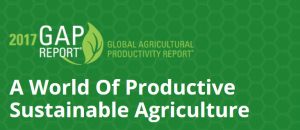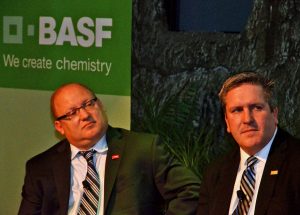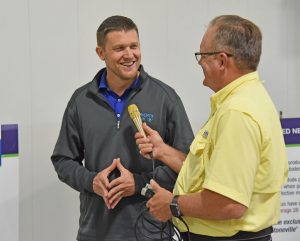 Monsanto has filed a complaint in Pulaski County Circuit Court in response to the Arkansas Plant Board’s decision to continue Arkansas’s ban of XtendiMax® for the 2018 growing season. The Plant Board overlooked extensive volatility data provided to it – including data EPA used in its registration decision, says Scott Partridge, Vice President of Global Strategy.
Monsanto has filed a complaint in Pulaski County Circuit Court in response to the Arkansas Plant Board’s decision to continue Arkansas’s ban of XtendiMax® for the 2018 growing season. The Plant Board overlooked extensive volatility data provided to it – including data EPA used in its registration decision, says Scott Partridge, Vice President of Global Strategy.- The AgGateway Annual Conference in San Diego, California will feature speakers on Inventory Management, “Design Thinking,” and Farm Data Challenges. The 2017 conference theme is “Efficiency-Opportunity-Profitability” and takes place November 6-9 at the Hilton Resort & Spa.
- Verdesian Life Sciences is offering growers a money back guarantee on their AVAIL and/or NutriSphere-N products for the coming season. Growers are guaranteed an increased yield or Verdesian will cover the product costs.
- Precision Tank, a leader in liquid storage solutions, has unveiled a new brand identity. The new brand represents the capabilities of two industry leaders, the former Precision Tank & Equipment (PT&E) and A & B Welding companies.
- Adama, a global crop protection company, has entered into agreements with Syngenta AG to transfer certain crop protection products and distribution rights in exchange for products in the Nufarm Limited line. These transfers are part of the acquisition of Syngenta by ChemChina.
SMART Farmer Rochelle Krusemark
 Rochelle Krusemark is a Minnesota grain and soybean farmer, a state and national soybean board and USFRA board member, wife, mother and grandmother – all at the same time!
Rochelle Krusemark is a Minnesota grain and soybean farmer, a state and national soybean board and USFRA board member, wife, mother and grandmother – all at the same time!
Obviously a busy lady, Rochelle squeezed in time as she was watching her two toddler grandsons to tell us what being a SMART farmer means to her, and why she is so passionate about education about agriculture. A former teacher herself, Rochelle has been a longtime advocate of the Ag in the Classroom program and has worked with Minnesota Soybean Research and Promotion Council (MSR&PC) and the U.S. Farmers & Ranchers Alliance (USFRA) start a program to help urban teachers learn more about agriculture so they can teach it to their students.
Listen to Rochelle here – SMART Farmer Podcast with Rochelle Krusemark, MN farmer
Agrikua’s Gender Equality Project = 1st at #YouthAgSummit
 Last week, I was given the opportunity to attend the 2017 Youth Ag Summit organized by Bayer Crop Science. Never have I ever attended such a motivating and uplifting agricultural event. 100 youth from 18-25 gathered in Brussels, Belgium to tackle some of the worlds leading issues in agriculture.
Last week, I was given the opportunity to attend the 2017 Youth Ag Summit organized by Bayer Crop Science. Never have I ever attended such a motivating and uplifting agricultural event. 100 youth from 18-25 gathered in Brussels, Belgium to tackle some of the worlds leading issues in agriculture.
During the Summit, delegates worked across the week in groups of ten to develop their ideas centered around the United Nations Sustainable Development Goals (SDG) of Gender Equality, Quality Education, and Responsible Consumption and Production. Groups pitched to a jury of experts and the audience. Winners were selected based on feasibility, innovativeness, and creativity. Bayer will be funding the top three future projects developed.
– Third place went to “Imperfect Picks”, a group who was assigned to work on SDG 12: Responsible Consumption and Production. These delegates impressed with their cartoon campaign to promote “ugly fruits” to children and enable a broader cultural shift towards accepting food that appears blemished but is still of good quality. They won €3,000 to further develop and implement their project.
– Second place went to “Seeds of Change”, a group of delegates focusing on SDG 4: Quality Education. They will use their prize of €5,000 to fund a project aimed at promoting agriculture in schools through young agricultural champions, in order to bridge the disconnect between people who consume, and people who produce food.
– First place was awarded to the group “AGRIKUA” (“kua” being the Swahili word for “grow”), whose project focuses on promoting Gender Equality (SDG 5) in the agricultural sector. Their plan to create an online professional platform for young Kenyan women seeking opportunities in agriculture impressed the jury and audience alike, and they took home the grand prize of €10,000. On top of this funding, the AGRIKUA delegates will also receive dedicated training and coaching to help make the project a reality. They will also be invited back to Europe to present their project to a relevant industry platform.
I was able to speak to the Agrikua spokespeople following the announcement to dive deeper into their project and hear their enthusiasm. Listen here: Interview with Agrikua
View and download photos from the event here: 2017 Youth Ag Summit Photo Album
Deere Wins Fight to Protect Green and Yellow
 It’s not easy being John Deere green – or yellow – especially if you are another equipment manufacturer.
It’s not easy being John Deere green – or yellow – especially if you are another equipment manufacturer.
A U.S. District Court in Kentucky this week ruled in favor of Deere & Company protecting the use of the trademark green and yellow color combination on John Deere agricultural equipment. The court decision permanently bans the use of the John Deere colors by FIMCO, Inc., a South Dakota company that manufactures and markets agricultural sprayers under the “Ag Spray Equipment” brand name.
The lawsuit asserted that FIMCO’s green and yellow equipment infringed on Deere’s trademark for the color combination. Deere also claimed that use of the colors by another manufacturer confuses the public as to where the product originated and dilutes the value of the John Deere brand.
The court ruled that John Deere’s green and yellow color combination qualified as a “famous” trademark since as early as the late 1960s and that FIMCO intentionally chose green and yellow to create an association with the John Deere brand. The court also found that FIMCO’s use of green and yellow was likely to cause confusion among purchasers as to whether its agricultural equipment was manufactured by or endorsed by John Deere.
GAP Report Says Ag Productivity Growth Too Slow
 The Global Harvest Initiative 2017 GAP report was released Wednesday at the World Food Prize symposium in Des Moines, and for the fourth straight year it shows that global agricultural productivity growth is not accelerating fast enough to sustainably feed the world in 2050.
The Global Harvest Initiative 2017 GAP report was released Wednesday at the World Food Prize symposium in Des Moines, and for the fourth straight year it shows that global agricultural productivity growth is not accelerating fast enough to sustainably feed the world in 2050.
“If agricultural productivity growth continues to decline, there will be significant ramifications for the economic vitality and environmental sustainability of food and agriculture systems. Farmers in low-income, food-deficit countries will use more land and water to increase their output, straining a natural resource base already threatened by extreme weather events and climate change,” said Margaret Zeigler, executive director of GHI.
The report finds the rate of agricultural productivity growth for low-income countries is only 1.24 percent annually – a decline from 1.5 percent in 2015 and 1.31 percent in 2016. GHI says global agricultural productivity must increase by 1.75 percent annually to meet the demands of nearly 10 billion people in 2050.
Doyle Karr, DuPont Biotechnology Public Policy director and chair of the GHI Board of Directors, says U.S. farmers are concerned about a number of issues that could impact their productivity, including consumer concerns about food production. “The global agriculture sector must renew our commitment to engage in dialogue with consumers through active conversation and collaboration. Farmers and consumers share the same goals, but often there is an information gap between them,” said Karr.
Precision Ag Bytes 10/18
 The Farm Foundation Forum on Wednesday, November 1 will explore the forces that drive soil and water conservation on farms today. It will begin at 9:00 a.m. at the National Press Club in Washington D.C. Register to attend in person or online.
The Farm Foundation Forum on Wednesday, November 1 will explore the forces that drive soil and water conservation on farms today. It will begin at 9:00 a.m. at the National Press Club in Washington D.C. Register to attend in person or online.- Wingtra, a drone company fast becoming an industry favorite for its aerial data collection, has formed a partnership with Pix4D. The relationship will provide end-to-end solutions including 2D map and 3D model construction from aerial data, and will offer Wingtra’s users the entire Pix4D software suite.
- U.S. Environmental Protection Agency Administrator Scott Pruitt has appointed Jim Gulliford of Missouri as regional administrator for Region 7. Mr. Gulliford will oversee environmental protection efforts in: Iowa, Kansas, Missouri, and Nebraska.
- Partnership for Ag Resource Management is pleased to announce that 62 Great Lakes Basin ag retailers participating in the program reported 2016 sales of products and services like variable rate technology that help keep phosphorus fertilizer on cropland and out of waterways. Variable rate phosphorus application in the Sandusky River Watershed increased 19% last year, from 51% to 70% of acreage serviced by participating ag retailers.
- Jeremy Peters, chief executive officer of the National Association of Conservation Districts, has earned the Center for Behavioral and Experimental Agri-Enveironal Research (CBEAR) prize for Agri-Environmental Innovation.
SaveSaveSaveSave
BASF Executives Discuss Bayer Acquisition
 BASF Crop Protection business executives held a conference call with reporters Tuesday to discuss the agreement announced last Friday to purchase significant Bayer assets in the largest deal of its kind in history.
BASF Crop Protection business executives held a conference call with reporters Tuesday to discuss the agreement announced last Friday to purchase significant Bayer assets in the largest deal of its kind in history.
The $7 billion deal includes Bayer’s global glufosinate-ammonium non-selective herbicide business, seed businesses for canola hybrids in North America under the InVigor® brand using the LibertyLink® trait technology, oilseed mainly in European markets, cotton in the Americas and Europe as well as soybean in the Americas. The transaction also includes Bayer’s trait research and breeding capabilities for these crops and the LibertyLink® trait and trademark. In addition, over 1,800 Bayer employees will transfer to BASF, in addition to corporate, manufacturing and research facilities in Germany, the United States, and Canada, the Americas and Europe.
Listen to Paul Rea, Senior Vice President BASF Crop Protection North America, and BASF U.S. Crop VP Scott Kay give an overview of the acquisition and answer reporter questions. Paul Rea and Scott Kay, BASF
Secretary Perdue in Europe
U.S. Secretary of Agriculture Sonny Perdue has been on a whirlwind trip around Europe for the past several days, starting with meetings in London before taking part in the G-7 ministerial, taking part in World Food Day in Rome and meeting Pope Francis yesterday, and concluding his trip today in Madrid.
“It’s been a very productive trip,” said Perdue during a media conference call this morning. “We’ve had …very frank and direct discussions about some of the restrictions the EU has placed.”
Listen to his opening statement here: USDA Secretary Perdue from Europe
On the call, Perdue answered reporters’ questions about issues such as the this morning’s announced rollback of Grain Inspection, Packers and Stockyards Administration (GIPSA) rules, European trade, and NAFTA. Secretary Perdue answers reporter questions
Bayer Proves Strong Commitment to Cotton
 With lots of things going on in the cotton industry, Bayer is reinforcing its overall commitment to cotton. The company recently opened a new Cotton Breeding Station in Lubbock, and hosted its 2017 Showcase Plot Tour there. The new facility provides a place for the breeding group and trade development group to collaborate at the same site, allowing them to drive innovation more quickly.
With lots of things going on in the cotton industry, Bayer is reinforcing its overall commitment to cotton. The company recently opened a new Cotton Breeding Station in Lubbock, and hosted its 2017 Showcase Plot Tour there. The new facility provides a place for the breeding group and trade development group to collaborate at the same site, allowing them to drive innovation more quickly.
“We’ve got the traits growers need, we’ve got the seed treatment packages and we’ve got all these harvest aids and a variety of things that we can just pull this whole thing together and really help the grower achieve their goals at the end of the year,” said Jason Wistehuff, Bayer Cotton Product Manager for North America.
Wistehuff said in field trials continue to provide the basis of the cotton breeding program, with areas like water use efficiency targets for future improvements.
Listen to Chuck’s interview with Jason Wistehuff here: Interview with Jason Wistehuff, Bayer
EPA Announces New Dicamba Rules
 The Environmental Protection Agency has announced new requirements for the use of dicamba formulations “over the top” to further minimize the potential for drift when applying to dicamba-tolerant soybeans and cotton.
The Environmental Protection Agency has announced new requirements for the use of dicamba formulations “over the top” to further minimize the potential for drift when applying to dicamba-tolerant soybeans and cotton.
EPA worked worked with impacted states and land-grant universities, as well as Monsanto, BASF and DuPont on measures that will allow farmers to make informed choices for seed purchases for the 2018 growing season.
Label changes that impose additional requirements for “over the top” use of these products next year include classifying the products as “restricted use,” permitting only certified applicators with special training, and those under their supervision, to apply them and requiring farmers to maintain specific records regarding the use of these products to improve compliance with label restrictions. Other restrictions include limiting applications to when maximum wind speeds are below 10 mph (from 15 mph), reducing the times during the day when applications can occur, including tank clean-out language to prevent cross contamination, and enhancing susceptible crop language and record keeping with sensitive crop registries.
American Soybean Association president Ron Moore of Illinois was encouraged by EPA’s label changes to allow farmers to continue to utilize this important tool while also working to protect and prevent damage to non-dicamba tolerant crops. “Moving forward, ASA looks forward to working with EPA, states, manufacturers and our farmers to implement these changes while also seeking the root cause of this issue so new technologies can be used in years to come,” said Moore.

